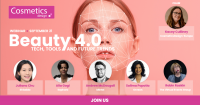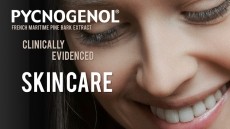‘Real opportunity’ for in-store beauty tech to aid consumer choice and experience: Mintel
![A large number of UK adults who buy beauty and grooming products say in-store technology would help the overall shopping experience [Getty Images]](https://www.cosmeticsdesign-europe.com/var/wrbm_gb_food_pharma/storage/images/_aliases/wrbm_large/publications/cosmetics/cosmeticsdesign-europe.com/article/2022/09/08/beauty-tech-in-store-holds-great-promise-for-consumer-experience-and-shopping-journey-says-mintel/15752187-1-eng-GB/Beauty-tech-in-store-holds-great-promise-for-consumer-experience-and-shopping-journey-says-Mintel.jpg)
In a transition that was kick-started by the migration to online shopping during the COVID-19 pandemic, the consumer’s relationship with brands in the digital space has moved beyond simple ‘search and buy’ transactions towards more immersive and connective experiences.
And this had accelerated beauty’s adoption of technology like Artificial Intelligence (AI), Augmented Reality (AR) and NFTs (Non Fungible Tokens) to create new experiences such as virtual skin analysis, personalised product recommendations, try-ons and exclusive metaverse offers, according to Samantha Dover, category director for beauty and personal care at Mintel.
“Investment in the online beauty channel ramped up during the COVID-19 pandemic, meaning certain applications of AI and AR are mainstreaming, including data-powered recommendations and virtual product trialling,” Dover told CosmeticsDesign-Europe.
However, she said most beauty tech investments had been focused on digital and e-commerce thus far – not necessarily the area with most promise or making the most impact.
According to Mintel data, 46% of UK adults who buy beauty/grooming products online said technology helped them buy new products online that they would previously have bought in-store. However, Dover still believed conventional incentives were more effective than slick tech when it came to actually persuading consumers to part with their money online.
“While such innovations are intended to make buying beauty online easier and more enjoyable, the impact remains relatively limited as consumers continue to be drawn to discounts, samples and reviews over technology when investing in new products,” she said.
In-store tech – the untapped opportunity
Rather than looking solely at applying tech in the digital space to drive online or even virtual sales, Dover suggested brands thought about how technology could be used to drive in-store sales and enhance the ‘bricks and mortar’ shopping experience.
And this was backed up by Mintel data showing 44% of UK adults who buy beauty/grooming products said more in-store technology would improve the shopping experience.
![Beauty brands should think about what tech can bring to in-store shopping experiences [Getty Images]](https://www.cosmeticsdesign-europe.com/var/wrbm_gb_food_pharma/storage/images/media/images/china_apac_asia_retail_cosmetics_makeup_shopping_store_consumers_couple_man_woman_lipstick_eyeshadow_exports_business/15752400-1-eng-GB/China_APAC_Asia_retail_cosmetics_makeup_shopping_Store_consumers_couple_man_woman_lipstick_eyeshadow_Exports_business.jpg)
“Looking ahead, one of the biggest opportunities in beauty technology is better facilitating research behaviours,” Dover said. “Beauty consumers are increasingly overwhelmed by choice and are looking for products that work. In recent years, this has seen the reliance on online reviews heighten, with the store experience lagging behind as consumers want to make educated purchases.
“This means there is a real opportunity to bridge the gap between online and offline with in-store technology, and beauty brands and retailers can look to major players in other industries, such as Amazon and Nike, to understand how technology can create a more seamless purchase journey,” she said.
Dover also said apps would become an increasingly powerful tool to elevate the in-store shopping experience in the future, but urged beauty brands and retailers to consider these as part of a holistic experience, rather than just a tool for selling products online.
“Those that do will be better placed to engage consumers and compete with the myriad of other apps vying for their attention,” she said.
Beyond ‘cool’ – tech needs to be practical
Mintel’s global director of beauty and personal care Andrew McDougall previously told this publication back in May there was no shortage of enthusiasm for new technology, with many looking to be “early adopters” in the space. And there had also been plenty of brand experimentation in beauty tech, with things like the metaverse and blockchain.
However, McDougall said efforts remained “a bit token and a bit gimmicky” and so wouldn’t generate “huge buy-in right now”.
Beauty 4.0 Webinar
Andrew McDougall will be part of CosmeticsDesign's upcoming Beauty 4.0 - Tech, Tools and Future Trends webinar this month - bringing deeper insight and discussion on what exactly consumers are looking for in beauty tech today.
Alongside executives from Sephora, Shiseido, Orveon and The Virtual Events Group, this discussion will be a not-to-miss event for anyone interested in beauty technology strategies at retail, brand or supply chain level. Register now today to join this free event here.
At present, he said the main focus for most brand involvement in the metaverse, for example, was shopping - taking real life products into the metaverse – though this was only the “first stage” in the evolution of the metaverse.
McDougall urged beauty brands to think beyond what was “cool” towards what was “functional”, thereby delivering a tangible benefit to the consumer.
“It’s about finding the real purpose - rather than tech being a gimmick - it is about working out how it can help improve day to day functions…The more practical uses of block chain and metaverse could be more functional than cool.”
He continued: “Block chain is interesting to look at because we think of it in terms of NFTs and cryptocurrency, but actually where digital ledger systems technology really becomes interesting and useful is when it is applied to supply chains to trace exactly where products come from.”
As well as demonstrating traceability, McDougall said block chain technology could be deployed as an anti-counterfeiting measure, whereby on purchasing a product, consumers would receive a certificate to prove its authenticity. “I think that is going to resonate well with consumers,” he said.
The danger with more complex applications, however, was that they could get a little lost on the consumer, despite offering clear benefits, according to Dover.
“The rise of personalisation in beauty is a great example of this; a lot of this kind of innovation is reliant on AI, however, although consumers are craving products that are tailored to their needs, it is likely that they care more about the end result than the brand’s process,” she said.

![The perceived value of a beauty product is now more important than ever for consumers, but it's not just about price [Getty Images]](https://www.cosmeticsdesign-europe.com/var/wrbm_gb_food_pharma/storage/images/_aliases/wrbm_medium/publications/cosmetics/cosmeticsdesign-europe.com/article/2023/03/09/mintel-says-value-key-in-beauty-during-cost-of-living-crisis-with-premiumisation-shopping-experiences-and-mood-key-trends/16238065-1-eng-GB/Mintel-says-value-key-in-beauty-during-cost-of-living-crisis-with-premiumisation-shopping-experiences-and-mood-key-trends.jpg)
![Building lasting and meaningful relationships with consumers via an array of digital tools will enable industry plug true needs and expectations [Getty Images]](https://www.cosmeticsdesign-europe.com/var/wrbm_gb_food_pharma/storage/images/_aliases/wrbm_medium/publications/cosmetics/cosmeticsdesign-europe.com/article/2023/03/07/beauty-retail-future-is-in-relationship-commerce-and-personalised-experiences-says-revieve-ceo/16229584-1-eng-GB/Beauty-retail-future-is-in-relationship-commerce-and-personalised-experiences-says-Revieve-CEO.jpg)
![According to the sustainability marketing specialist, blockchain also enables brands to share their sustainability 'journey' with interested shoppers [Getty Images]](https://www.cosmeticsdesign-europe.com/var/wrbm_gb_food_pharma/storage/images/_aliases/wrbm_medium/publications/cosmetics/cosmeticsdesign-europe.com/article/2023/02/27/green-beauty-claims-secure-and-transparent-with-blockchain-technology-says-provenance/16202977-1-eng-GB/Green-beauty-claims-secure-and-transparent-with-blockchain-technology-says-Provenance.jpg)
![Consumers and retailers are demanding greater transparency and ways to prove product authenticity, green claims and wider supply chain stories [Getty Images]](https://www.cosmeticsdesign-europe.com/var/wrbm_gb_food_pharma/storage/images/_aliases/wrbm_medium/publications/cosmetics/cosmeticsdesign-europe.com/article/2022/11/30/eu-digital-product-passports-good-for-green-beauty-future-says-map-emulsion-and-sorga-founder/15985130-1-eng-GB/EU-digital-product-passports-good-for-green-beauty-future-says-Map-Emulsion-and-SORGA-founder.jpg)






![Chinese study highlights mental health challenges in atopic dermatitis, emphasising holistic patient care. [Getty Images]](https://www.cosmeticsdesign-europe.com/var/wrbm_gb_food_pharma/storage/images/_aliases/wrbm_tiny/publications/cosmetics/cosmeticsdesign-asia.com/headlines/formulation-science/chinese-research-linking-atopic-dermatitis-to-mental-health-underscores-need-for-holistic-care/17040623-1-eng-GB/Chinese-research-linking-atopic-dermatitis-to-mental-health-underscores-need-for-holistic-care.jpg)








